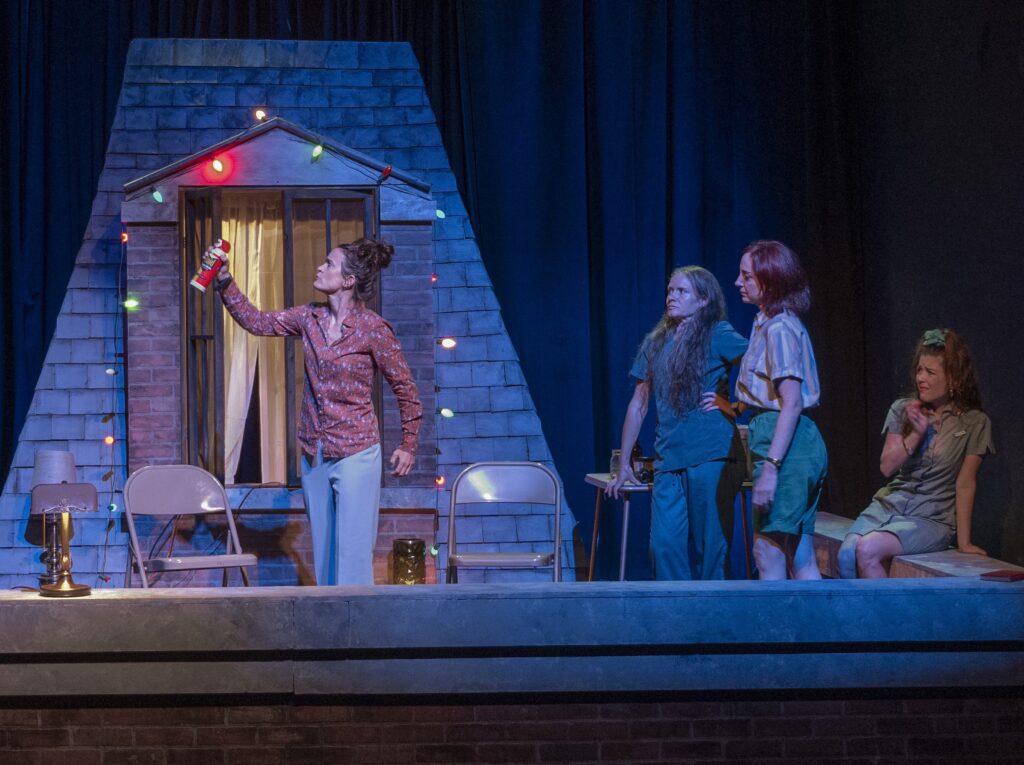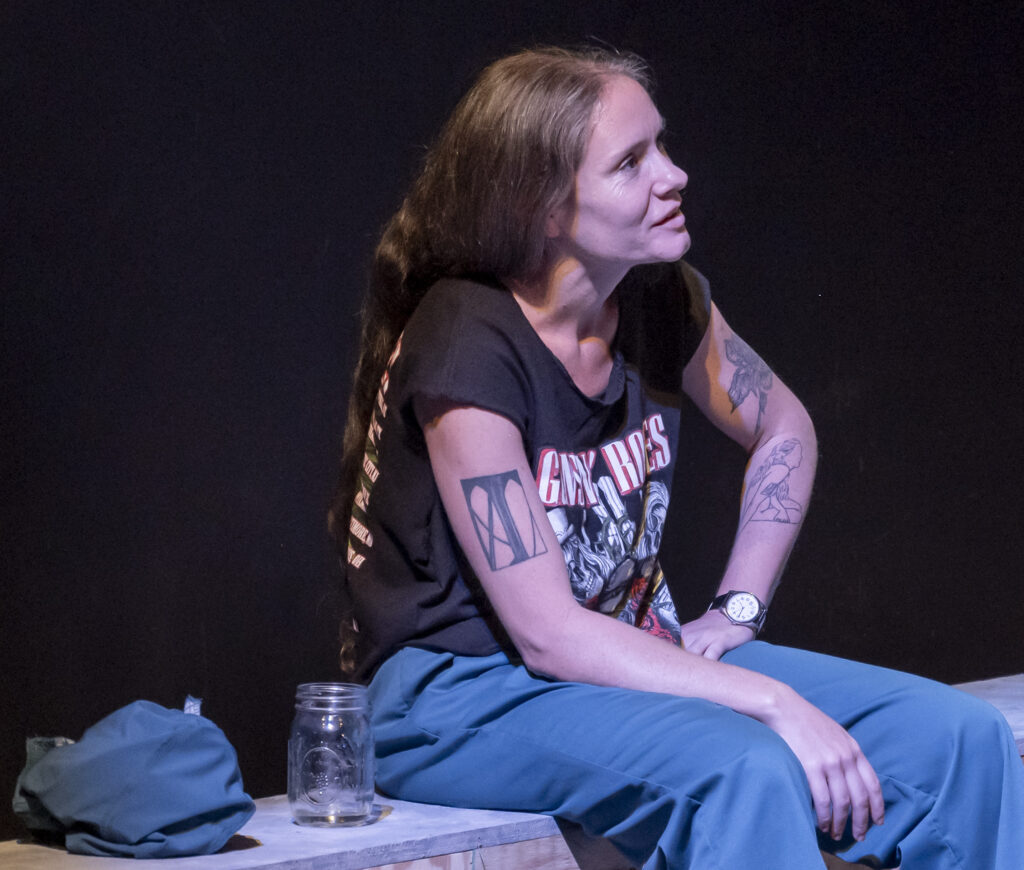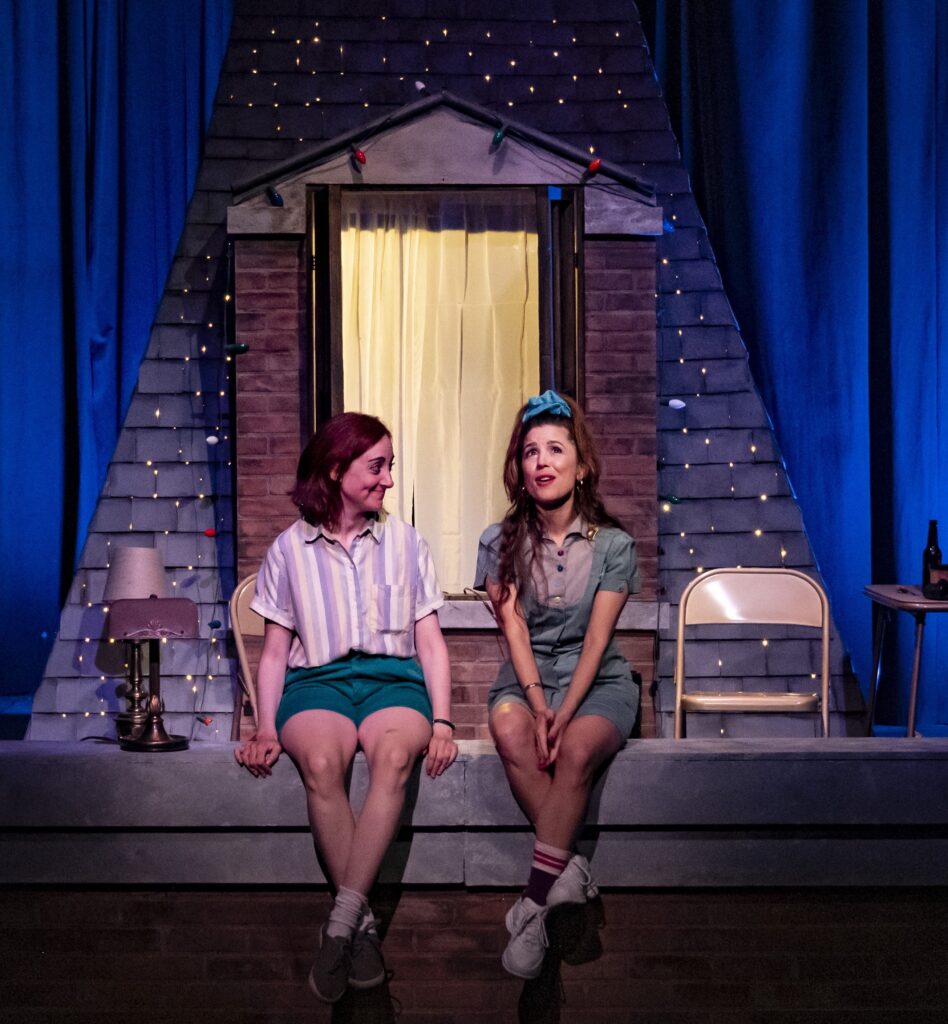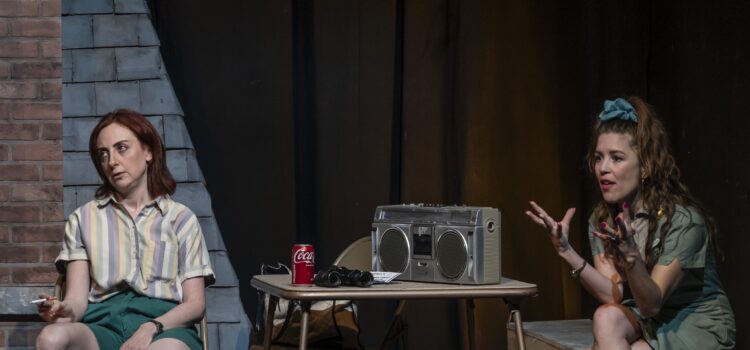By Lynn Venhaus
Women leading lives of quiet desperation are hanging out on a rooftop one sweltering summer evening in red brick south city St. Louis.
Intrigued? In the smartly written and well-acted “Dr. Ride’s American Beach House,” you are not going to get a pat script here. In fact, St. Louis playwright Liza Birkenmeier’s comedy-drama provokes more questions than answers – but in a good way.
It’s Friday, June 17, 1983. The time, date and place are firmly established if the play does not, or refuses to, fit into tidy boxes. The songs of that summer, catchy radio hits, immediately take you back to that period as they blare out of a boombox.
NASA nerds can point to that night as the eve of astronaut Sally Ride’s groundbreaking achievement as the first American woman in space as part of the Challenger Space Shuttle mission.
To these unfulfilled women hanging out in the sticky humid air “near Highway 55 and the Mississippi River,” they realize this is a giant leap forward for women, at least professionally. But for Dr. Ride, she can’t acknowledge that she’s gay until she announces it in her obituary nearly 30 years later, revealing her partner of 27 years, Tam O’Shaughnessy.
However, it’s still a big-deal achievement that they are in awe of – risky, bold, adventurous. Not spoken out loud is that it was just a different time – that uncomfortable putting on a front to not make waves move so many accepted as the way it had to be.

They are stuck in ruts of their own choosing, as they stay in second gear living inauthentic lives. Harriet and Matilda, seemingly lifelong friends who share a deeper relationship and should be self-aware that their failure to launch is self-inflicted, display a palpable bond and familiar shorthand. Whatever is currently troubling them is suppressed in exchange for quips and vague discontent.
The setting is Harriet’s place, a sanctuary above where the hum of her air-conditioning unit dripping water – that irritates her landlady Norma (Lizi Watt)—is a nuisance that she’s ignoring.
As played by the intuitive Lindsay Brill, Harriet’s a wallower, a quick-to-be irritated woman going nowhere. She has returned from visiting her dying mother in Florida, carrying plenty of emotional baggage, and is drinking a beer and eating ice cream straight out of a carton for dinner. There is mention of a boyfriend, but that reeks of convenience.
She’s as restless as bestie Matilda, who has stopped by, still wearing her waitress uniform, singing snippets of Fleetwood Mac’s “Dreams,” and griping about her sick child and lack of a supportive husband. Clearly a life choice that she seems ill-suited for, as she tosses off quips and complaints. She brings up that she is smart, a chip-on-the-shoulder retort — after all has an MFA in poetry. We can tell her verbal skills are highly evolved, and Bridgette Bassa breezes in as a force to be reckoned with – but maybe she’s all talk?
These two women may rhyme together, but nothing else does in their fragmented lives. It would be an ordinary, insignificant night, but it’s not, really.
Birkenmeier, now living in New York City, made her off-Broadway debut with this play, which premiered in 2019 after being commissioned by Ars Nova in New York. It was a New York Times Critics Pick and a finalist for the Lambda Literary Award in Drama.

This is her return to St. Louis Actors’ Studio as a playwright, after her astonishing performance in “Blackbird” in 2018, nominated for Best Actress in a Drama by the St. Louis Theater Circle. She appears to have an old soul and a sharp wit.
Annamaria Pileggi directed her then, and helms this current production, intending for us to read between the lines. Pileggi, STLAS’ associate artistic director, is assured in drawing out the personalities of these dissatisfied women who sadly lack the tools to take the reins of their own lives.
They are ‘meeting’ for the Two Serious Women Book Club, but really, that’s not happening, although newcomer Meg comes over to join them by invitation. Now Meg, as played by an assertive RN Healey, is everything these two are not: comfortable in her own skin. Wearing a rock band T-shirt and showing tattoos while wearing scrubsi, she could easily stand up and unapologetically sing “I Am What I Am” at a nearby karaoke.
Are Harriet and Matilda afraid of pursuing their own journeys, hiding in the trappings of a humdrum life because it would be too difficult to take the road not traveled?
That’s for you to ponder – especially if you think we are our choices.
For certain, this production features vibrant, fully realized performances, punctuated by an astute selection of songs of the day. (Brilliant choices – especially the misunderstood “Every Breath You Take” hit by The Police, not a love song suitable for weddings).
You will hear the sounds of loneliness, remembering what you had and what you lost.
Patrick Huber’s interesting rooftop set design captures the modest space of multiple story flats, with thrift shop finds, aided by Kristi Gunther’s effective lighting design, using accent lamps and strings of lights as twilight falls.
Emma Glose’s sound design is crisp and clear, and her props selection reflect life 40 years ago. Abby Pasterello has wisely chosen appropriate costumes, hair and makeup looks. And as always, Stage Manager Amy J. Paige keeps things flowing smoothly.
This robust 90-minute production indicates Birkenmeier has a special voice and showcases a tight quartet who were at ease playing complicated females. We can look back now, and say affirmatively women have come a long way.
St. Louis Actors’ Studio presents “Dr. Ride’s American Beach House” Oct. 6-22, with Thursday through Saturday performances at 8 p.m. and Sundays at 3 p.m. at The Gaslight Theatre, 358 N. Boyle Ave., St. Louis. Tickets are available through Ticketmaster or at the box office one hour prior to the performance. For more information, visit www.stlas.org


Lynn (Zipfel) Venhaus has had a continuous byline in St. Louis metro region publications since 1978. She writes features and news for Belleville News-Democrat and contributes to St. Louis magazine and other publications.
She is a Rotten Tomatoes-approved film critic, currently reviews films for Webster-Kirkwood Times and KTRS Radio, covers entertainment for PopLifeSTL.com and co-hosts podcast PopLifeSTL.com…Presents.
She is a member of Critics Choice Association, where she serves on the women’s and marketing committees; Alliance of Women Film Journalists; and on the board of the St. Louis Film Critics Association. She is a founding and board member of the St. Louis Theater Circle.
She is retired from teaching journalism/media as an adjunct college instructor.

